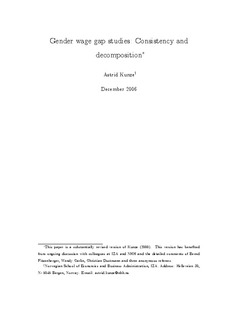| dc.contributor.author | Kunze, Astrid | |
| dc.date.accessioned | 2007-03-01T13:04:22Z | |
| dc.date.available | 2007-03-01T13:04:22Z | |
| dc.date.issued | 2006-12 | |
| dc.identifier.issn | 0804-6824 | |
| dc.identifier.uri | http://hdl.handle.net/11250/163072 | |
| dc.description.abstract | This paper reviews the empirical literature on the gender wage gap, with particular
attention given to the identification of the key parameters in human capital
wage regression models. This is of great importance in the literature for two main
reasons. First, the main explanatory variables in the wage model, i.e., measures of
work experience and the time-out-of-work, are endogenous. As a result, applying
traditional estimators may lead to inconsistent parameter estimates. Second, empirical
evidence on the gender wage gap hinges on estimates of the parameters of
interest. Accordingly, their economic meaning may be limited by restrictive assumptions
included in wage models. This challenges both researchers and policymakers
who require precise measures of the gender wage gap in order to create and enforce efficient equality policies. | en |
| dc.language.iso | eng | en |
| dc.publisher | Norwegian School of Economics and Business Administration. Department of Economics | en |
| dc.relation.ispartofseries | Discussion paper | en |
| dc.relation.ispartofseries | 2006:37 | en |
| dc.subject | male-female wage differentials | en |
| dc.subject | human capital wage regression model | en |
| dc.subject | model construction and estimation | en |
| dc.subject | wage discrimination | en |
| dc.title | Gender wage gap studies : consistency and decomposition | en |
| dc.type | Working paper | en |
| dc.subject.nsi | VDP::Samfunnsvitenskap: 200::Økonomi: 210::Samfunnsøkonomi: 212 | en |
